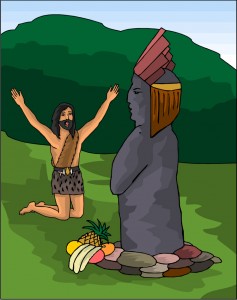
For a Christian to claim to be a Gentile is like claiming to be a pagan or a heathen as Paul defines the term in Ephesians chapter two.
Ephesians 2:11, Gentiles. Paul says in a number of places that those who come to Yeshua are no longer Gentiles but are the children or seed (literally “sperm,” which is the meaning of the Greek word) of Abraham (Eph 2:11–19; Rom 4:16; 9:8–11; Gal 3:7,9,14,28–29). The word Gentiles as used in the Scriptures (both in the Hebrew and the Greek languages) simply means “ethnic groups or nations.” There are many places in the Scriptures where Jews and Israelites are referred to as “Gentiles.” There is no class of people called Gentiles in the spiritual body of Yeshua. Scripture uses the following terms for the redeemed of YHVH: the saints, the called out ones (or church), the body of Yeshua (1 Cor 10:16; 12:27; Eph 4:12) the one new man (Eph 2:15), sons of Elohim (Rom 8:14, 19; Phil 2:15; 1 John 3:1, 2), children of Elohim (Rom 8:16, 21; Gal 3:26; 1 John 3:10), or Abraham’s offspring (Gal 3:29), the bride (Rev 18:23; 21:2, 9; 22:17) for example.
Any attempt by anyone to keep the Jew—Gentile division alive within the body of Yeshua is in effect keeping up the middle wall of partition that the Apostle Paul gave his ministry life and eventually his physical life to tearing down (see Eph 2:11–19). It is also going against the clear teaching of the Scriptures, which say that within the spiritual body of Yeshua, there is no longer Jew or Gentile/Greek (Rom 10:12; Gal 3:28; Col 3:11).
The Scriptures reveal that there are only two classifications of people: Israelites and non-Israelites or Gentiles. The former has eternal life because of their relationship with the Elohim of Israel through the Messiah of Israel. The latter group, unless they repent of their sin (i.e. lawlessness or Torahlessness, see 1 John 3:4), will burn in the lake of fire because their names weren’t written in the book of life (Rev 20:11–15).
Whenever Paul uses the term Gentiles, he is either referring to ethnicity, and not using the term as a spiritual designation, or he is using the term Gentile to mean “worldly.” In the latter case, it is a moniker referring to those who are carnal in that they act like gentiles (heathens) who are “without God and without hope” (Eph 2:12).
Throughout the Epistle to the Ephesians (and elsewhere) Paul, when speaking to the believers in that congregation, uses terms like saints, we, us, sons, the church, his body, one new man, one body, fellow citizens, members of the household of Elohim, the whole building, a holy temple, body of Messiah, a perfect man, the whole body, children of light, her, she, and members of his [Yeshua’s] body. In Ephesians, Paul uses the term Gentiles only five times (Eph 23:11; 3:1, 6, 8; 4:17), and this not as the ultimate spiritual designation for redeemed believers who had come from a non-Jewish background. Rather, Paul uses the term Gentiles as he was either referring to their past spiritual history (Eph 2:11; 4:17), to his mission to evangelize non-Jewish people (Eph 3:1, 8), or in stating that Gentiles should take their place as fellow spiritual heirs along with the Jews within the spiritual body of Yeshua (Eph 3:6).
The term Gentile is not a spiritual designation for a redeemed believer, for they have been called out of the Gentile world and have become a member of a special group the Testimony of Yeshuas labels as “the called out ones” or “church” (Gr. ecclesia). Scripture also calls called out ones or redeemed believers saints meaning “set-apart” (Gr. hagios) from the Gentile world that is without Elohim and without hope. Scripture teaches that those who are redeemed or who are “in Messiah” are no longer Gentiles, for they have been grafted into and become part of the nation of Israel (Rom 11:13–24 and Eph 2:11–19). They have become the one new man about which Paul speaks in Ephesians 2:15.
Now that we know that we are really part of a people group called “Redeemed Israel” what does one do with this information? That is up to you. Pray and ask your Father in heaven to help you to live out your new identity as an Israelite.
Many people upon finding out that Scripture actually defines them as Israelites (through the blood of Yeshua, Eph 2:11–16) and not Gentiles, begin to sense a need to begin acting more like Israelites in their lifestyle and beliefs. They become interested in the biblical feasts and Sabbaths of Israel and their life takes on a more Hebraic or Jewish flavor as they see themselves more in the light of the Book of Acts believers. This is a path that you will need to begin to explore. As you go down this journey, please keep in mind the words of Yeshua in Matthew 5:17–19; John 15:15 and the words of the apostles in 1 Corinthians 11:1 and 1 John 2:3–6 along with Romans 7:12,14 and 3:31.
We must also keep in mind that there are only twelve gates through which one can enter the New Jerusalem, and these gates are named after the twelve tribes of Israel (Rev 21:12). There is no Gentile gate! The only way that one will be able to enter the New Jerusalem will be through spiritually identifying with the tribes of Israel. So which tribe are you?
Finally, YHVH, the God of the Bible, never made any covenants with non-Israelite nations—only with the nation of Israel. To be in covenantal relationship with YHVH, one has to accept the Jewish Messiah, and be grafted into the Israelite olive tree through the Messiah and become an Israelite—PERIOD! For example, the writer of the Epistle to the Hebrews clearly states that the New Covenant is made with the two houses of Israel—not the Gentile nations (see Heb 8:8 and Jer 31:31,33). This may come as a shock to some people reading this, but this is the truth of Scripture.







